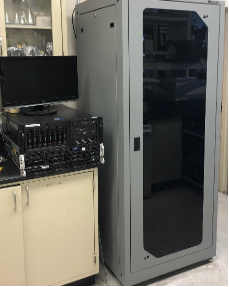Computational Modeling and Simulations
Structural modeling, molecular dynamic simulations, and molecular docking

The Core also proposes to provide expertise in deriving, representing, and manipulating the three-dimensional structures of biological molecules. Molecular modeling allows researchers to obtain viable structures for proteins of interest, while molecular docking allows one to predict the interaction between molecules. Molecular Dynamic simulations allow researchers to study the motions of atoms and molecules in a biological system.
Together these in silico approaches provide the key to:
- Understand the molecular basis of protein structure and function.
- Examine how a drug can bind with and protein.
- Perform a Quantitative Structure Activity Relationship (QSAR) to modulate the efficacy and affinity of a drug with its target.
- Identify functionally relevant molecular motions within biological complexes.
Modeling and simulations
Consultations and Data Collection/Analysis: This charge is for training personnel, helping to collect, analyze and interpret data. ($125.00/hr)
For computer access and usage fees please contact the core.